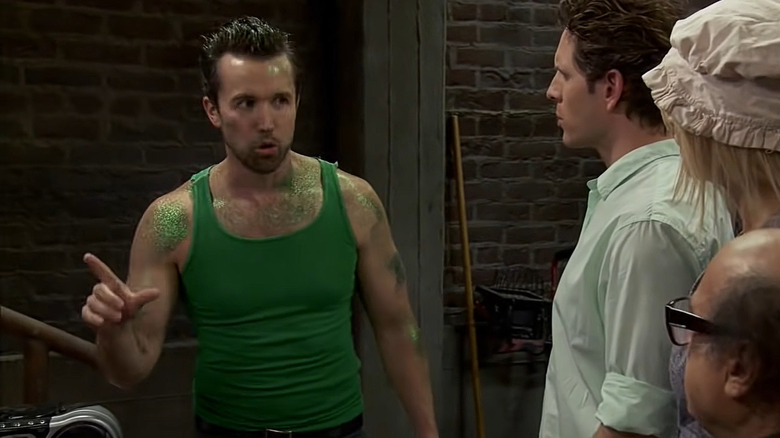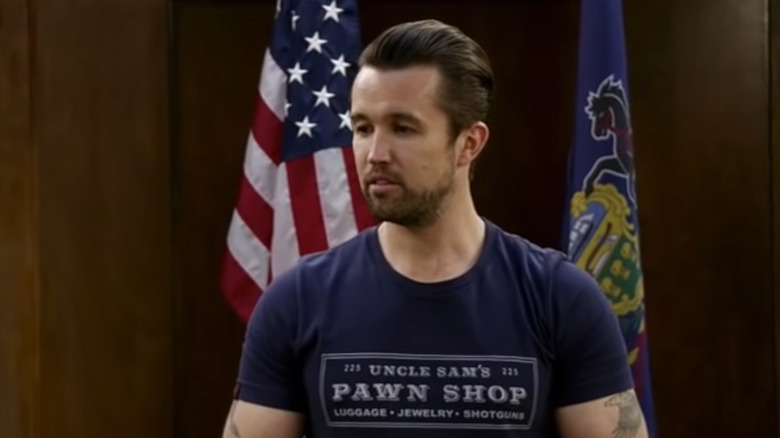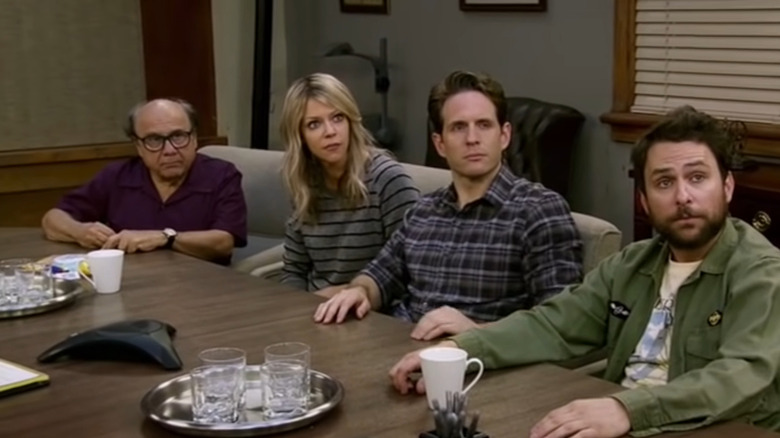Mac's Sexuality Wasn't Predetermined For The It's Always Sunny In Philadelphia Creators
When going back to the first season of "It's Always Sunny in Philadelphia," there is a lot of weird stuff that should stick out to you. The first is the lack of Frank (Danny DeVito); somehow the show survived a whole eight episodes without the iconic character around. The second is the fact that Mac (Rob McElhenney) is straight. He's not a clearly closeted guy as he's been throughout most of the show; he's genuinely interested in the ladies, and a ton of subplots involve the extreme lengths he'll go through to sleep with one of them. Although some fans love to pretend like the show planned out Mac's gay arc from day one, it's pretty clear that he's intended to be a genuinely straight man for at least the first four or five seasons. When asked in a Rolling Stone interview when the show started toying around with the idea of making Mac gay, Rob McElhenney explained:
"We were looking at Mac at one point, and I was like, 'He is such an arch Catholic conservative when it suits him, and when it doesn't, he drops that.' And most of the people I know in that camp tend to be fairly homophobic. So we began going down that road: Let's satirize that hard Christian conservative who is also intensely homophobic. OK, so what's the next step from there? And that's when I thought, 'Let's just make him gay.'"
The "homophobe who's secretly gay" trope is well-trodden ground, but it's rarely been written as sharply (or taken to as much of an extreme) as it was with Mac over the years. In season 9 he asks the gang to join him in greasing up a bunch of "beefcakes" while still being a supposedly devout Christian who considers homosexuality an abomination.
Can't stay closeted forever
Mac's turning point was in the season 11 finale two-parter, "The Gang Goes to Hell," in which he finally comes out of the closet, only to go back into it at the end. It makes for some fun comedy, but there were plenty of fans who were disappointed that one of Mac's first bits of actual character development was undone just a few minutes later.
"I didn't expect it, but there was a massive outpouring from our LGBTQ fans, who were really upset. They felt like, 'Oh, wow, he finally came out ... This is a really fun and cool character,'" McElhenny explained. "That made them feel like it was a chance for us to do something different, and we put him back in the closet. We thought about it over the off-season, and I realized, 'Man, that is a bummer. We had an opportunity there, and we screwed it up.'"
Even beyond just being nice to Mac and queer viewers, the issue also reflected a basic rule of comedy: You can only make the same sort of jokes for so long before they grow stale. They mined a few years' worth of comedy out of Mac's hypocrisy, but now it was time to do something new. This was all addressed in season 12's, "Hero or Hate Crime?" in which Mac realizes, through an absurd legal loophole, that he can claim a winning lottery ticket just by saying he's gay. He comes out of the closet, chanting, "Gay Mac rules! Gay rich Mac!" with the attitude of someone clearly just saying this for the money. But then after he wins and the gang gives him the chance to return to the closet, Mac refuses. "Yeah. I'm ... I'm gay," he says. "Actually feels pretty good."
A rare respite from cynicism
"Hero or Hate Crime?" ends with a rare moment of decency from the gang, as the other four seem pleasantly surprised and genuinely happy on his behalf. Yes, they do still stick him with the bill for the arbitration, but they choose to wait until the next day to tell him about it. "Let's let him have this," says Dennis. As a whole, the gang is no less toxic or dysfunctional following this episode, but Mac's personality does certainly shift a little. Rather than being loud and aggressive, constantly trying to assert his manhood, late-seasons Mac is a lot more quiet and childlike. New gay Mac largely just wants to be loved and accepted, even though he'll probably never achieve that goal.
Despite the whole gang's inherently tragic nature, the show still goes on to give Mac rare moments of hope and humanity, like the season 13 finale where he does that absurdly well-choreographed dance number that finally makes Frank understand him. Most audience members probably went into the scene expecting some sort of punchline, but they never got one. The joke was that there was no joke, that the show was randomly treating us to three full minutes of heart-wrenching sincerity. Rob McElhenney explained that with the dance number, they wanted to "surprise people and do something different."
The dance number "doesn't traditionally feel like what we're doing thematically with the show," he admitted, but where's the fun in a show that doesn't switch things up every once in a while? "Always Sunny" has been going strong for sixteen seasons now, and maybe it's the show's willingness to improvise, to evolve its tone in unexpected ways, that's helped them pull it off.


